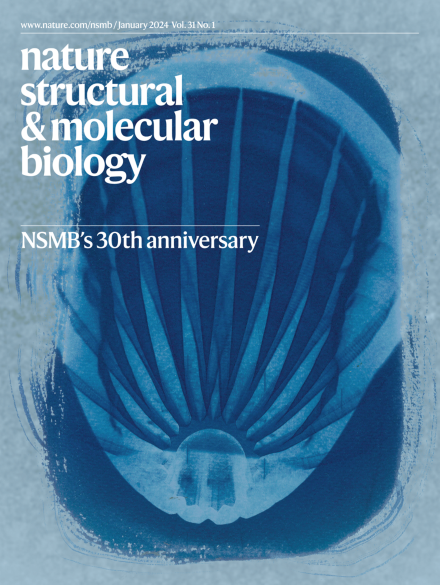Designed repeat protein in complex with Fz7
IF 16.8
1区 生物学
引用次数: 3
Abstract
To discriminate between closely related members of a protein family that differ at a limited number of spatially distant positions is a challenge for drug discovery. We describe a combined computational design and experimental selection approach for generating binders targeting functional sites with large, shape complementary interfaces to read out subtle sequence differences for subtype-specific antagonism. Repeat proteins are computationally docked against a functionally relevant region of the target protein surface that varies in the different subtypes, and the interface sequences are optimized for affinity and specificity first computationally and then experimentally. We used this approach to generate a series of human Frizzled (Fz) subtype-selective antagonists with extensive shape complementary interaction surfaces considerably larger than those of repeat proteins selected from random libraries. In vivo administration revealed that Wnt-dependent pericentral liver gene expression involves multiple Fz subtypes, while maintenance of the intestinal crypt stem cell compartment involves only a limited subset. Chris Garcia, David Baker and colleagues use a computational approach to develop designed repeat protein binders (DRPBs), which function as human Frizzled (Fz) subtype-selective antagonists and enable identification of Fz subtypes active in different organs.设计与Fz7复合物的重复蛋白
区分在有限数量的空间遥远位置上不同的蛋白质家族的密切相关成员是药物发现的挑战。我们描述了一种计算设计和实验选择相结合的方法,用于产生靶向具有大的形状互补界面的功能位点的结合剂,以读出亚型特异性拮抗的细微序列差异。重复蛋白通过计算与靶蛋白表面的功能相关区域对接,该区域在不同的亚型中不同,并且界面序列首先通过计算然后通过实验针对亲和力和特异性进行优化。我们使用这种方法产生了一系列人类Frizzled(Fz)亚型选择性拮抗剂,其广泛的形状互补相互作用表面比从随机文库中选择的重复蛋白的表面大得多。体内给药显示,Wnt依赖性中央周围肝基因表达涉及多种Fz亚型,而肠隐窝干细胞区室的维持仅涉及有限的亚型。Chris Garcia、David Baker及其同事使用计算方法开发了设计的重复蛋白结合物(DRPBs),该结合物起到人类Frizzled(Fz)亚型选择性拮抗剂的作用,并能够识别在不同器官中活性的Fz亚型。
本文章由计算机程序翻译,如有差异,请以英文原文为准。
求助全文
约1分钟内获得全文
求助全文
来源期刊

Nature Structural &Molecular Biology
生物-生化与分子生物学
自引率
1.80%
发文量
160
期刊介绍:
Nature Structural & Molecular Biology is a monthly journal that focuses on the functional and mechanistic understanding of how molecular components in a biological process work together. It serves as an integrated forum for structural and molecular studies. The journal places a strong emphasis on the functional and mechanistic understanding of how molecular components in a biological process work together. Some specific areas of interest include the structure and function of proteins, nucleic acids, and other macromolecules, DNA replication, repair and recombination, transcription, regulation of transcription and translation, protein folding, processing and degradation, signal transduction, and intracellular signaling.
 求助内容:
求助内容: 应助结果提醒方式:
应助结果提醒方式:


